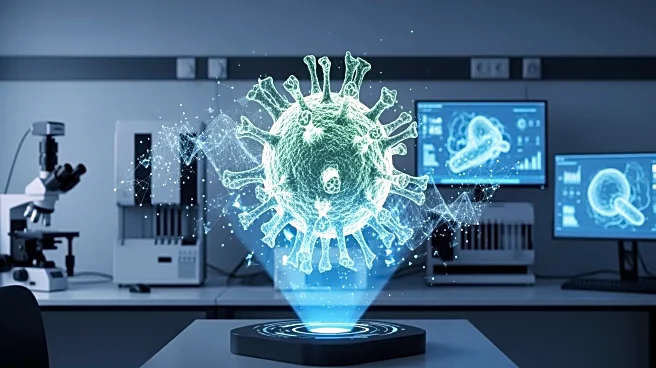What's Happening?
A study has evaluated the use of ChatGPT in generating reports for automated microbial identification and antibiotic susceptibility testing systems. The AI model was trained using the latest CLSI guidelines
to improve report accuracy and clinical decision-making. ChatGPT demonstrated improved performance in providing structured interpretations for complex diagnostic scenarios, such as enzyme-mediated resistance mechanisms and novel resistance patterns. The study highlights the potential of advanced language models to streamline laboratory processes and support healthcare professionals in diagnostic tasks.
Why It's Important?
The application of ChatGPT in clinical microbiology represents a significant advancement in the use of AI for healthcare. By enhancing report accuracy, the AI model can improve clinical diagnostics, leading to better patient outcomes. The ability to process complex datasets efficiently can reduce the workload on clinical microbiologists, allowing them to focus on more critical tasks. This development also underscores the transformative role of AI in healthcare, potentially setting a precedent for its integration into other areas of medical diagnostics and laboratory workflows.
What's Next?
Future studies are expected to validate the use of ChatGPT across diverse geographic and socioeconomic contexts to ensure its generalizability and scalability. As the AI model continues to demonstrate reliability, it may influence the development of similar tools for other diagnostic systems. Stakeholders, including healthcare providers and technology developers, will likely explore further collaborations to enhance AI capabilities in clinical settings. The success of this application could also prompt regulatory bodies to establish guidelines for AI integration in healthcare, ensuring safety and efficacy in patient care.
Beyond the Headlines
The integration of AI in clinical microbiology raises ethical considerations about the role of human judgment versus machine decision-making. While AI can improve efficiency and accuracy, it also necessitates robust data privacy and security measures to protect patient information. Additionally, the reliance on AI for critical diagnostics highlights the need for ongoing education and training for healthcare professionals to adapt to new technologies. Long-term, the use of AI in healthcare could lead to a cultural shift in how medical professionals approach diagnostics and treatment planning.








